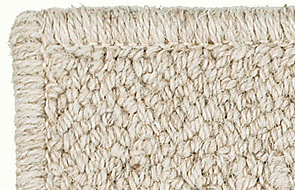
By Jeanette Maxwell*

I have been told by a staff member that a major retirement village operator has specified only nylon carpet for its villages.
I don’t want to reveal the name just yet as we will be contacting them, let alone the Campaign for Wool, but it dumbfounds me.
If it is what I suspect, a spurious concern over linting, then that’s a specification issue. It seems very strange to deny people the choice of healthy natural fibres especially in a retirement village because natural wool is good for you.
A big benefit of wool is outstanding flame resistance. Having a high moisture and protein content it tends to extinguish flames and does not melt or drip either like synthetics. Wool also stabilises relative humidity by absorbing or releasing moisture during periods of high or low atmospheric humidity. That’s a benefit from evolution.
If wool is maintained then it will absorb and neutralise airborne particles and fumes such as formaldehyde, sulphur dioxide and nitrous oxides. Wool is also resistant to static build up and being naturally curly, bounces back into shape after being crushed.
Wool carpet also happens to be hypo-allergenic. Surely what a retirement village desires. Wool does not promote the growth of dust mites or bacteria or give off harmful emissions.
To the operator in question “you cannot be serious!”
In a few months time a brand new textile, made up of 70 percent Kiwi mid-micron wool and 30 percent Chinese rice straw, will start commercial production in China. This perhaps has the potential to create significant demand for New Zealand crossbred wool and comes from those visionaries at Wellington textile house, The Formary.
Sally Shanks and Bernadette Casey are the type of Kiwis who can turn trash into treasure. They’re the same people who worked with Starbucks to create WoJo; a fabric blend of Kiwi crossbred wool with used coffee sacks to be used in Starbucks upholstery.
Of course the Chinese deal represents a potential iceberg given the country produces about 200 million tonne of rice every year. As Bernadette Casey told the Otago Daily Times last year, there was "a heck of a lot" of rice straw left over and much of it was burnt.
What this tells me is that farmers were bang on the mark backing further research into a business case for a wool levy 2.0.
Personally and professionally speaking, we’ve got to put the means to unlock the value of crossbred wool and that comes from doing things differently and better.
That includes turning our trash into treasure including what locally owned Z Energy is doing with biodiesel. It is investing $21 million to build a plant at Wiri. This will convert tallow feedstock into biodiesel and while I don’t know vegans will react to ‘animal fuel’, to me, this is a masterful example of recycling.
I have kept an eye on this ever since I read that the University of Auckland had developed a process for biodiesel production from tallow.
According to the university, “the novel process is applicable to any fat or oil feedstock and can handle low purities. The advantage over conventional processes is speed and efficiency which enables minimum capital equipment and maximum cost-efficiency. Unreacted methanol is recycled so the process is environmentally friendly.”
Z Energy will produce 20 million litres of biodiesel a year to be blended with traditional diesel. While a fraction of the one billion litres of diesel that Z sells each year, so is the quantity of tallow being used. It will take some 14,000 tonne to produce 20 million litres but that represents less than ten percent of the tallow we produce each year.
As a farmer I will not complain if a by-product can be turned into much a higher value item.
To be successful this new biodiesel will need consumer buy-in as it will cost up to 2c more a litre.
Surely not an issue with the amount of green consciousness that we’re told is prevalent.
It is also an example of green tech in blended economic development, if you excuse the bad pun.
But isn’t it a delicious return of serve given that the man-made fibres a certain retirement village is using, starts off in a barrel of oil.
-----------------------------------------------------------------------
Jeanette Maxwell is Federated Farmers Meat & Fibre chairperson and a version of this item was first printed in the Ashburton Guardian.
We welcome your comments below. If you are not already registered, please register to comment
Remember we welcome robust, respectful and insightful debate. We don't welcome abusive or defamatory comments and will de-register those repeatedly making such comments. Our current comment policy is here.